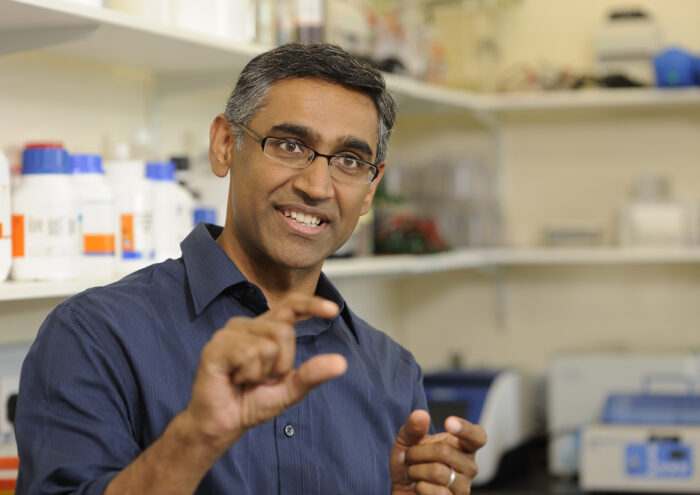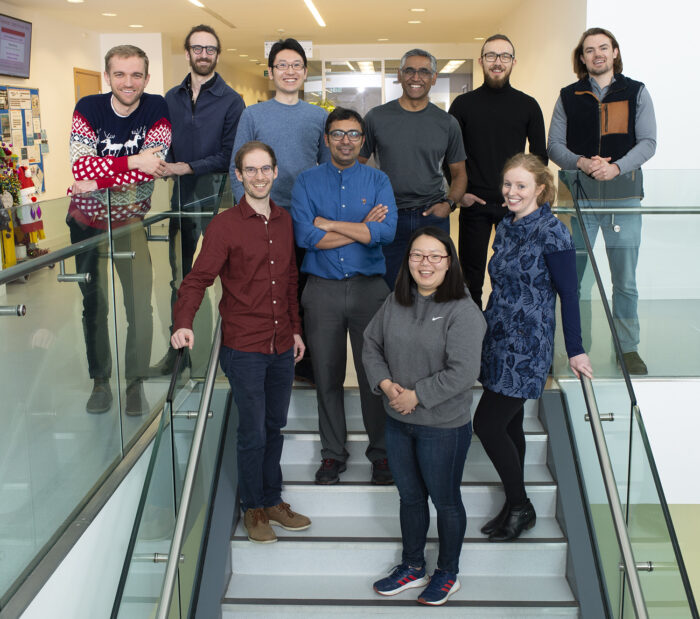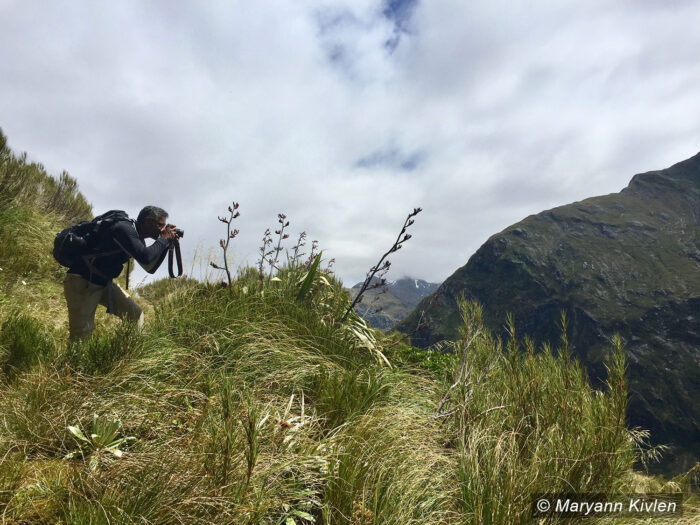From the scientist’s view: a conversation with … Manu Hegde

Ramanujan (Manu) Hegde is a Group Leader and Joint Head of the Cell Biology Division at LMB.
Manu earned his MD and PhD degrees at the University of California San Francisco (UCSF). He then led a lab at the NIH (National Institute of Health, USA) for eleven years before moving to the LMB about 8 and a half years ago.
Manu’s lab studies how proteins are made and matured to their final functional product, and how the cell recognises when this process fails and targets the proteins for degradation.
We recently caught up with Manu to learn more about him and his views on science.
What is special about working at the LMB?
I moved to the LMB from the NIH, where I had already established a lab … for 11 years … was already tenured, so I had absolutely no intention of ever leaving. At that time, I got a completely random email from one of my colleagues at the LMB, Ben Nichols, who asked if there was any chance I would ever consider moving. This seemed like a very unlikely possibility but I agreed to come and visit and give a seminar. The moment I came to the LMB and looked to see what kind of place it was, it just seemed like a perfect fit. There are a lot of things about it that attracted me immediately. First, it was a very compact place – this was in the old building – everybody was on top of each other and everybody talked to each other all day. Additionally, on my schedule was … coffee with so-and-so or tea with so-and-so, and I thought this was just some British way of doing things. But sure enough, at 10 o’clock we went up to have coffee in the canteen, and I think that was my first experience with the canteen where you see a large proportion of the building talking to each other. Seeing so many people interacting all the time was very much inspiring for me. I also liked the fact that all the groups were rather small. When I went to go meet with group leaders over the course of my day, many of them were in the lab, and this was extremely attractive to me.
Do you have a ‘LMB hero’? How has their work influenced you or made your research possible?
I didn’t really know anyone [at LMB] before I moved here particularly well. However, since moving here, several of my colleagues have really influenced the directions that our research has taken. This has occurred because when you come across some new finding, you look around and there are people working on certain topics who you are confident will advise you, tell you what the interesting problems are and what things have already been tried. Within the LMB, we’ve gotten much more interested in translation and the ribosome, and that comes across because Venki Ramakrishnan is just down the hall in Structural Studies. We’ve gotten more interested in RNA degradation – Lori Passmore is interested in that topic. Our in depth investigation into things involved with ubiquitination or quality control certainly was influenced by having David Komander nearby.

What inspired you to choose this particular area of research?
I chose an area of research mostly by accident. I was in medical school, and I was not particularly inspired by the way it was taught, because it is largely memorisation and not about actually figuring out how things work. So I asked one of my professors if I could perhaps work in his lab, but he felt that medical students really were useless in the lab. He gave me the name of a colleague of his who he felt would be amenable to having me in the lab. Of course at the time you didn’t have Google, you couldn’t look up what the person did, and so I just left a message on this person’s phone machine. Then, at 7am on a Sunday morning, he called me back and asked if I was interested in meeting. Fortunately, at the time, I used to live right across the street from UCSF, so I said, “I’ll be there in about 10 minutes.” This became my graduate mentor, Vishu Lingappa, and that’s how I got interested in this area; I’ve stayed in the same field ever since.
What is the coolest thing about your research?
That’s a tough question. I think the coolest thing [about doing research] is that moment where you get a confusing result. This has happened quite a number of times, and the reason it’s so cool is because, unlike when you get a result that you expect which has a certain degree of satisfaction, a confusing result really makes you think. It allows you to talk to people in your lab and brainstorm about what might be happening. Then all of a sudden, you look back through your old notebooks and a whole series of experiments that never made sense at the time immediately click into place. And that, I think, is easily the coolest thing, and certainly the most satisfying thing, about doing science.
What is the worst experiment you have ever done? What did you learn from it?
There are a number of blind alleys that one can go down in science and I think these are hard to predict when you first start. [Sometimes] I wish I had thought through the problem more carefully before we actually started. There are a lot of ideas that you first imagine are going to be incredibly productive or incredibly interesting, but then it’s not until years later that you realise perhaps it wasn’t the right time for that idea, or the tools didn’t exist, or sometimes the idea just turns out to be wrong. When I started my lab, one of the ideas that I really wanted to pursue was how the process of getting proteins into the endoplasmic reticulum might be regulated. The basic steps had been understood to some degree at the time, but I thought that there might be unexpected modes of regulation there. I still really like this idea, but we spent quite a number of years looking into this without, really, the proper tools. I think now, with the ability to manipulate things much more precisely, … we should probably be able to go back to this problem.
What do you think makes a good scientist? What skills do you think you need?
I think each person has a different set of skills that makes them great. So some people are amazingly technical, they have this mindset of being able to invent new methods, build new machines and really push the boundaries. Whereas others are much more conceptual. There’s not one particular formula for being a great scientist. But I think what unifies a large proportion of really outstanding scientists is an exceptional nose for how to ask a good question. There’s no doubt that this is a big challenge in science. Asking a question that’s both deep and has long staying power but is nevertheless tractable within your scientific lifetime – I think that’s a very tough balance to strike.
What key piece of advice would you like to pass on to future scientists?
Advice for future scientists is always a bit fraught because I think everyone is a bit different and responds to different types of advice. I think that it is important to see how other people approach science and to take what you see as the best aspects of it away from that. I look at each person, and take away the things I particularly admire. Are they particularly creative? Are they incredibly broad thinking? Are they very well read? And you somehow make an amalgam of each of these different qualities. If I were to give advice to somebody just starting, it’s to take advantage of the environment that you’re in, learn how different people do science and find out which one fits your personality the best. I think that’s one of the things that I probably regret during my time at UCSF. In the 1990s it was probably one of the most exciting places to do science and I didn’t really realise that. I wish I talked to more people at the time, learned more about how they do it. Somehow it seemed that many colleagues were just so well-known that they were almost unapproachable. But the reality was, in fact, they weren’t. To people just starting, that would be advice I would give.

What is your favourite thing to do away from science?
Most of the time I spend, of course, in the lab. Science is what I absolutely love. I do however occasionally get out of the lab. I would say that I’ve never had a single hobby that I’ve pursued – I tend to be a serial hobbyist. There are periods of time where I’ve been incredibly interested in looking at the stars and astronomy and then that will pass. Then I’ll get interested in travel and hiking, and then I’ll get interested in photography for some period of time. Outside of the lab now, I like nature and I like going to different parts of the world and seeing nature either through hiking or simply just travelling. Cooking is another thing that I enjoy doing outside of work.
Manu was interviewed for the LMB Alumni Newsletter on 20th November 2019′
Further references: